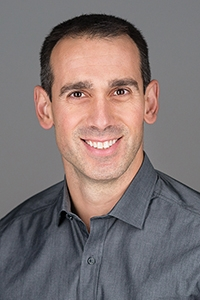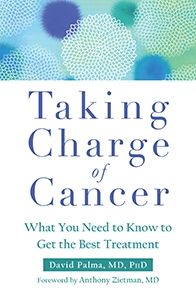Cancer Doc: Patients Can Take Control
As we’ve seen in our focus on cancer this month, there are many ways patients can cope with cancer diagnosis and treatment. What many do not know is that they can also control what their medical team does about it. Dr. David Palma is a cancer researcher whose book Taking Charge of Cancer (New Harbinger Publications) discusses just how much control patients have over their treatment. Turns out, it’s more than you’d think. Below, we discuss options.
Your book is called Taking Charge of Cancer, but don’t many patients feel as though they are far from in charge? Everybody from health care professionals to the cancer, itself, seem to be in charge.

David Palma: "Many doctors now realize that we are not in charge."
It can be very overwhelming to receive a diagnosis of cancer, and often patients feel like they are not in control. In this situation, it’s important to pause, take stock of the situation, and take steps to ensure that you are well-informed, getting the best recommendations, and getting the best treatment. This helps patients feel again that they are in control of their lives.
Many doctors now realize that we are not in charge. Twenty years ago, medicine was very paternalistic. Patients were expected to listen to their doctor’s recommendation without question. But attitudes have changed. Many doctors have now moved to a model of shared decision-making, where the patient comes to a decision based on their own preferences and values, taking into account advice from their doctors.
Some cancer patients remain skeptical about the ability of medical science to treat them and seek alternatives or fads. What do you advise skeptical patients?
It’s good to be skeptical of anything in life.
I often work through those issues with my patients. It is very difficult from the perspective of the patients: they hear all sorts of claims: that doctors are hiding a cure, or that cancer can be cured by avoiding sugar, avoiding meat, trying to change the acidity of your blood, using IV vitamin C … the list goes on. I discuss many of these in *Taking Charge of Cancer, *along with tools to help them distinguish myths from truths.
I just ask that patients bring the same skepticism to the “alternative” claims they are considering. It’s very easy for someone to set up a website claiming a false cure, and often the website involves the sale of some sort of dubious product. One example is intravenous vitamin C. Trials of high-dose vitamin C in patients have not shown any improvements in fighting cancer, yet this doesn’t stop people from selling it and making false claims about it online. It is heartbreaking to see patients paying hundreds of dollars a week for intravenous infusions of vitamin C, based on misinformation that’s been provided to them.
What is the most important question a cancer patient or loved one should ask a doctor before beginning treatment?
If I have to pick just one question, it would be this: “What is the goal of my treatment – is it to cure my cancer, or just slow it down?”
Treatments designed to cure a cancer are called “curative,” whereas those designed to slow it down are called “palliative.” This is a critical distinction, because it affects all your subsequent decisions, including how aggressive to be in your treatment, whether you want treatment at all, how to spend your time, and how you make plans for the future.
But we know that doctors are not doing a good job of telling people this important piece of information. Many studies in the US and elsewhere have indicated that large numbers of patients who are receiving palliative chemotherapy think that it is intended to cure.
It seems we always read about new targeted cancer treatments in the research phase, new drug delivery technologies that target cancer cells, but not healthy ones. How long before we see these leave the lab?
We have already seen many of these leave the lab and make it into the clinic. One of these, called imatinib or Gleevec, made the cover of Time magazine more than a decade ago. In the past few years, we’ve even seen the advent of immunotherapy—-treatments that activate the immune system to attack the cancer—-and many of these are game-changers for certain types of cancers. Research has made a huge difference for these cancers, and that’s why I’ve directed that 100 percent of author royalties from this book go directly to cancer research.
How vigilant do patients need to be to ensure they are being treated properly by their doctors?
Very vigilant. When someone is going to buy a new car, they research it online, pepper the sales rep with questions, and take the car for a test drive. People don’t want to waste money, buy a lemon, or put their lives at risk.
But for cancer care, where the stakes are much higher, traditionally many people have done nothing in this regard. Many patients have been unaware that the quality of cancer care—-0and their chances of survival—-can depend on the expertise of their team, and the place where they choose to have their treatment. Taking Charge of Cancer teaches patients how to obtain and understand their medical records, how to double-check that they are being told about all their treatment options, and how to make sure they are receiving world-class care.
What other books do you recommend for cancer patients or their loved ones?
My two favorite cancer-related books are not geared toward providing information about treatment, but are masterpieces dealing with other aspects of the disease. The Emperor of All Maladies is a Pulitzer-prize-winning book that takes the reader through a thrilling history of cancer, and the story of the fight against cancer, including many of the successes and failures. The second is the New York Times bestseller When Breath Becomes Air, the touching memoir of Paul Kalanithi, a young neurosurgeon diagnosed with incurable lung cancer while still in his thirties.

Howard Lovy is executive editor at Foreword Reviews. You can follow him on Twitter @Howard_Lovy
Howard Lovy
